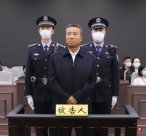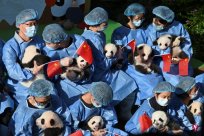Early
Hunsheng Paper
I walked home late at night, and saw a strange scene in the familiar street corner: a long team lined up under the street light column, and the starting point of the team was a small cart.Noodles, sausages, meat slices, bean sprouts, and plastic lunch boxes are put on the cart. On the simple stove on one end of the cart, the fat master of sweat is flipping up and down with a spatula.
The small fried noodle stall handled by this person is so rude and so attractive.The fried noodle aroma of the hot pan is somewhat. If there are too many night owls waiting in line, I also want to buy a copy and take it home as a supper.
In the center of the car, the roadside stalls will only quietly appear when the night is quiet.But in two months, they may become a new landscape on the streets of Shanghai.
The Shanghai People's Congress Standing Committee revised the regulations on the management of environmental sanitation in Shanghai last week.For the practices such as "stalls and operations, occupying the road" that have been completely banned in the past, the new version of the regulations stipulate that in addition to key areas such as main roads, landscape areas, and commercial concentrated areas, the district government and township governments can delineate specific public areas for use for it for for use for it for for use for it for used for it for used for it for used for it for for use for it for used for it for for use for it.Set up stall operations, sell self -produced agricultural and sideline products and other business activities.
The new rules will be implemented on December 1 this year.After the news came out, the topic of "Shanghai no longer banned the roadside stalls" once rushed to the Weibo hot search list, but the response was sincerely.Some people believe that the roadside stalls make the city more fireworks, and the new regulations reflect the transformation of Shanghai's urban governance concept.There are also pessimistic predictions that this is just a measure of alleviating employment pressure. "In the cold winter of the economy, they need this fireworks; when economic prosperity, they think you destroy the city's appearance."
In the early days of the outbreak of the crown disease epidemic in 2020, China had emerged in the wave of "stall economy".In March of the Sichuan provincial capital, Chengdu was the first to loosen the mobile vendors in March, which led to 100,000 jobs.
This approach was affirmed by Chinese Prime Minister Li Keqiang during the "Two Sessions" (National People's Congress and the CPPCC Annual Meeting) that year, and many provinces and cities, including the capital Beijing, have successively relaxed the management of mobile vendors.The Central Civilization Office also issued a notice that it will no longer list the Dao Dao operation, road market, and mobile merchants as the content of the evaluation and assessment of civilized cities.
But not long after, official media such as CCTV and Beijing Daily began to cool down for the "stall economy", saying that once blindly follow the trend, the "stall economy" will eat the hard -won urban governance results.Beijing officials subsequently began to strictly investigate the behavior of the Taoist stalls, and the documents of the Central Civilization Office were deleted.With the shadow of China's economy out of the first wave of epidemic, the "stall economy", which was not hot, gradually disappeared.
The "Stall Economy" did not form a climate in Shanghai two years ago, but instead showed vitality before and after Shanghai Fengcheng this year.On the eve of the city, every household rushed to hoard vegetables. For a while, many fruits and vegetables sold along the street appeared.In the early days of unblocking, many shops were not allowed to open the door to welcome customers. Barber shaved their heads on the roadside on the roadside. Restaurants that had not yet opened the hall also moved the tables and chairs to the outdoor, and started a "outside" business.
Compared with the fixed store, the ground stall has a low threshold and a fast back.For people with severe impact on the epidemic, relaxing the management of mobile vendors, adding a new way for them to maintain basic livelihood, and also helps to relieve short -term employment pressure.However, it is obviously unrealistic to rely on this marginal city economic activity to drive the domestic demand of 25 million people and to reverse the weak consumption.The "stall economy" is difficult to improve in terms of value -added space and scientific and technological content, and it is impossible to serve as long -term and core motivations for the Shanghai economic breakout.
If the "stall economy" in the first half of the year is triggered by the consumer demand of the people's backlog, the official actively relax the control of the roadside stalls, which is more like a helpless move for the economic situation, highlighting the stretching of the policy.Essence
Shanghai Wednesday (September 28) announced a new round of steady growth measures to help industries that have a greater impact on epidemic in culture, tourism, exhibitions, and aviation.Specific measures include subsidies for film fares, one -time business suspension subsidies and current limit subsidies for theater, and subsidies for rental fees for foreign economy exhibitions held in Shanghai this year.
In terms of promoting consumption and investment, the official will also provide subsidies for consumers who purchase large commodities such as home appliances and cars, issue loan interest subsidies for small and medium -sized enterprises, and continue to attract foreign companies to settle in Shanghai.
However, the temporary exhibition that the temporary cancellation was caused by the losses caused by the long -term suspension of the theater and the cinema; the temporary cancellation of the suspended cancellation of the lady and the soldiers were lost.The general environment is not downturn, the people's consumption momentum has weakened, and small businesses dare not loan easily, and foreign companies' investment is more cautious.The high alert and lack of confidence in the overall economy of the epidemic prevention policy are difficult to boost through one -time subsidies.
As a pioneering place in China's policy reform, some people expect that the practice of relaxing the management of roadside stalls in Shanghai can create a precedent for other cities, so that the "stall economy" style will bring fireworks and humanity to large and small cities again.In fact, it is better to make the epidemic prevention policy more flexible and more flexible than a gust -style corporal economy. It is more flexible to create a more friendly environment for operators and investors, and the economy is more tough.




